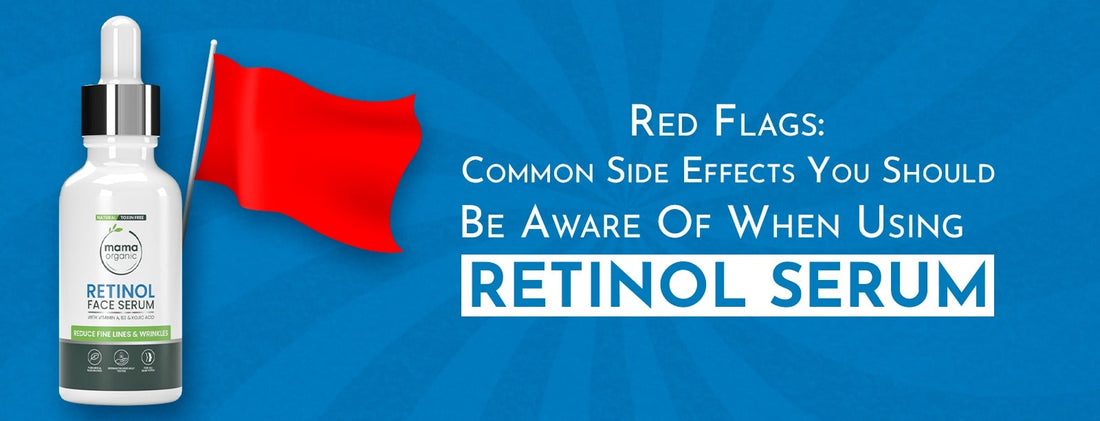Retinol Serum are celebrated for their transformative effects on the skin. They can smooth fine lines and brighten your complexion. However, diving into the world of retinol without caution can bring about a host of side effects. This guide sheds light on the potential pitfalls of retinol serums. This is especially true for those exploring options. For example, the best retinol serum for beginners. Or, the best budget Retinol Serum in Pakistan. Let's navigate the journey of retinol usage safely, keeping an eye out for red flags.
The Side Effects of Retinol
There are many benefits to adding a serum with retinol to your skincare routine. However, it's crucial to approach this powerhouse ingredient with care. Here are some common side effects associated with retinol use:
1. Skin Irritation and Dryness
One of the most reported issues by retinol users is skin irritation. This can manifest as redness, dryness, and flaking. It can happen, especially when starting a retinol regimen. It can also happen if the product's concentration is too high for your skin type.
2. Sensitivity to Sunlight
Retinol can make your skin more sensitive to UV rays, increasing the risk of sunburn. It's essential to pair your retinol routine with a high-SPF sunscreen.
3. Initial Acne Flare-ups
Some users experience an initial increase in acne breakouts when they start using retinol. This is often a temporary phase. The skin adjusts to increased cell turnover, pushing impurities to the surface.
Choosing the Right Retinol Serum
When selecting a retinol serum, especially if you're new to this ingredient, choosing products like the Mamaorganic Retinol Serum can be a wise choice. It's designed with beginners in mind. It offers a gentler introduction to retinol, minimizing the risk of adverse reactions.
Key Considerations for Beginners
Start with Concentration
Beginners should look for products with a lower concentration of retinol. This helps the skin adjust gradually.
Patch Test
Before fully integrating a new retinol serum into your skincare routine, do a patch test. Gauge your skin's reaction. Follow instructions. Typically, start with a small amount applied a few nights a week.
Mitigating Side Effects
To minimize the chances of experiencing side effects, slowly integrate retinol into your skincare routine. Hyaluronic acid and niacinamide are hydrating and soothing ingredients. They can help counteract dryness and irritation. There are several points to consider for reducing the impact of side effects;
1. Gradual Introduction
Start with a low concentration of retinol and use it sparingly at the beginning. Applying retinol once or twice a week initially can help your skin adjust. This can prevent excessive irritation.
2. Use Hydrating Ingredients
Incorporate products containing hyaluronic acid and niacinamide into your routine. These ingredients provide essential moisture and soothe the skin. They help alleviate the dryness and irritation caused by retinol.
3. Apply Moisturizer
After applying retinol serum, follow up with a moisturizer. This locks in hydration and protects the skin barrier. This can help reduce flakiness and peeling.
4. Sun Protection
Retinol can increase your skin's sensitivity to the sun. Always apply a broad-spectrum sunscreen with an SPF of 30 or higher during the day. Apply it even if you use retinol only at night.
5. Be Patient and Observe
Pay close attention to how your skin responds to retinol. If you notice severe redness, burning, or irritation, reduce the frequency of application. You can also switch to a product with a lower concentration of retinol.
6. Avoid Certain Combinations
Retinol can react with other potent ingredients. These include vitamin C, benzoyl peroxide, and AHA/BHAs. To prevent over-irritation, avoid using these in the same part of your routine as retinol.
7. Consult a Dermatologist
If you have sensitive skin or are unsure how to use retinol, ask a dermatologist for advice. They can recommend products and concentrations suitable for your skin type and concerns.
When to Consult a Dermatologist
If you're considering a retinoid serum in Pakistan, especially one with a higher concentration of retinol, it's best to consult with a dermatologist. This is especially true if you have sensitive skin or existing skin conditions. A professional can provide tailored advice. They can also recommend the best retinol serum for your skin type and concerns.
Conclusion
Retinol Serum promise revitalized, younger-looking skin. However, they may have potential side effects. Choose the right product, like Mamaorganic Retinol Serum for Beginners. Follow a cautious approach to enjoy retinol benefits while minimizing risks. Remember, the journey to healthy skin is personal and requires patience and care. Listen to your skin. Don't hesitate to seek professional advice. It's a safe way to navigate the world of retinol serums.

